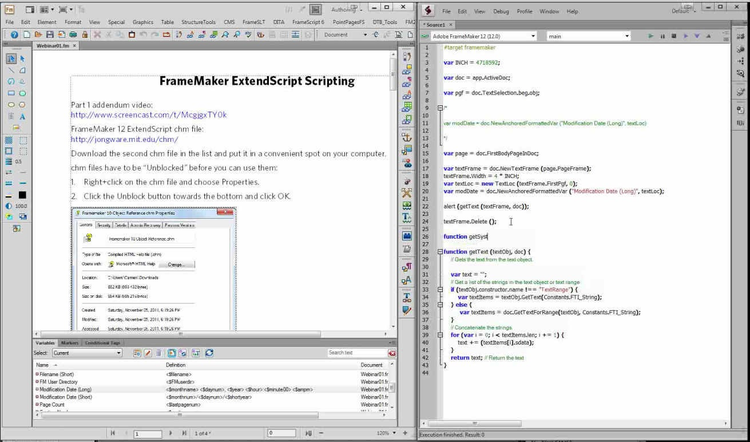In January, long-time FrameMaker maven, Rick Quatro of Carmen Publishing, did a guest appearance in the second of a 2-part series on FrameMaker ExtendScripts. You may view the recording of “FrameMaker: How to write your own ExtendScripts, Part 2” here.
This session (Part 2) continues the process of creating a broadly useful ExtendScript for automating common tasks in FrameMaker, step-by-step. You can get a recording of the session here.
Please also see our blog post for Part 1 of the session here.
NOTE: This session displays a “Files” pod, which enables you to download the actual script that Rick is creating, for your own hands on.
Minute Markers for key highlights in the webinar recording “FrameMaker: How to write your own ExtendScript, Part 2”
06:00
Identify which SW you are targeting (e.g. FrameMaker, not InDesign)
07:00
Determining insertion point for insertion of a variable
08:00
Object Model Viewer to see Classes and Properties/Methods available in ExtendScript
09:00
Using the fm12 Object Reference 1.0 *.chm file, which lists QuickLinks to “methods” or what behaves like VERBS
09:45
PROPERTIES describe relevant document properties necessary for letting a method work.
11:30
Variable for NewAnchoredFormattedVar (can copy the sample code and then fill-in the blanks)
12:45
editing var modDate so it will use “Modification Date (Long)” as the format
13:20
Specifying text location:- a paragraph - “0” to indicate beginning of the paragraph
15:00
Commenting out the first working task, so the 2nd task can be created and tested separately
15:44
Creating a temporary text frame and manually inserting a DATE system variable so format of date can be inserted into a marker
16:50
Locating NewTextFrame object. Noting that this can have a parent object (e.g. an Anchored Frame)
17:45
Pop-up menu of hints appears as you type in your definition for a method
19:40
Demonstration of the process for selecting an appropriate parent object

